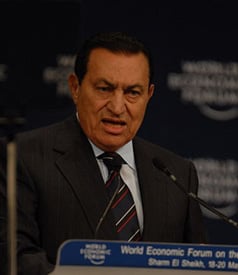Cairo — Egyptian President Hosni Mubarak vowed Saturday to “cut off the hand of terrorism” after a suspected suicide bomber attacked a Christian church in the Mediterranean port city of Alexandria and killed at least 21 people as worshippers emerged from a New Year’s Day mass.
It was the deadliest attack against the country’s Christian minority in more than a decade and the latest in a wave of violence against Christians in the Middle East. Experts said that it would stoke growing tension between Egypt’s majority Muslims and Coptic Christians, who make up about 10 percent of the country’s 80 million people.
“This terrorist act has shaken the conscience of the nation. The blood of our children will not be lost and we will cut off the hand of terrorism,” Mubarak said in a televised address. “I promise all Egyptians that all plots will fail to upset Egypt’s stability or break the ranks of its Muslims and Copts.”
While no group immediately claimed responsibility, Egyptian authorities blamed “foreign elements” and experts said that it carried the hallmarks of an al Qaida operation. If the strike was indeed carried out by al Qaida, it would mark a surprising new security threat in Egypt, a staunch U.S. ally on counterterrorism where security forces normally keep a tight lid on militants.
In a statement, President Barack Obama said that the attackers “were clearly targeting Christian worshipers, and have no respect for human life and dignity. They must be brought to justice for this barbaric and heinous act.”
Nearly 80 people were injured in the attack. Ambulances rushed to the scene where bloodied bodies lay scattered in the midst of glass shards, while blood was splattered on the street and on the church walls, according to news services.
Clashes erupted throughout the day in Alexandria as Christians hurled stones and bottles at anti-riot police, who used tear gas against the mob. The protestors, some wielding crosses covered with bloodied clothes, chanted anti-Mubarak slogans, blaming the government for not doing enough to protect them.
Last fall the Islamic State of Iraq, an affiliate group of al Qaida, said it would strike against the Coptic Church, which it accused of holding two women against their will after they reportedly had tried to convert to Islam to obtain divorces, which are barred by the Copts.
That incident had been the spark for a deadlier attack on Christians in Baghdad in October, when a team of suicide attackers stormed a church during evening mass and prompted a shootout with Iraqi commandos that left 58 people dead.
Eyewitnesses in Alexandria, Egypt’s second largest city, said that the blast occurred after a car parked outside the church exploded about a half-hour after the stroke of the new year. The blast caused two other cars parked nearby to blow up.
“I see al Qaida’s fingerprints on this operation,” said Amr al Shobaki, an expert on Islamic militant groups at the Al Ahram Center for Strategic and Political Studies, an Egyptian think tank.
He said that the timing, expertise and organized approach of the bombing were different from the more ad hoc attacks Egypt has experienced in the past.
“The effect is dangerous in any case,” he said. “There is a real crisis and an ongoing tension between Christians and Muslims, and this attack could exacerbate an already bad situation.”
Human rights groups said that Mubarak’s government had failed to address longstanding security complaints by Copts, who accuse Egyptian courts of going too easy on perpetrators of violence against them.
The Copts’ grievances aren’t unique in Egypt, where dissidents of all stripes face prosecution or intimidation for challenging the status quo. However, Copts have long said that they struggle to obtain national identity cards and permits to build churches, and they are noticeably missing from top posts in the security services.
In November, Christian demonstrators in Cairo clashed with police forces over the construction of a church outside the capital. Last January seven Christians died in a drive-by shooting outside a church in northern Egypt as worshippers were leaving mass.
(Shashank Bengali contributed to this report from Baghdad.)
Join us in defending the truth before it’s too late
The future of independent journalism is uncertain, and the consequences of losing it are too grave to ignore. We have hours left to raise the $12,0000 still needed to ensure Truthout remains safe, strong, and free. Every dollar raised goes directly toward the costs of producing news you can trust.
Please give what you can — because by supporting us with a tax-deductible donation, you’re not just preserving a source of news, you’re helping to safeguard what’s left of our democracy.
